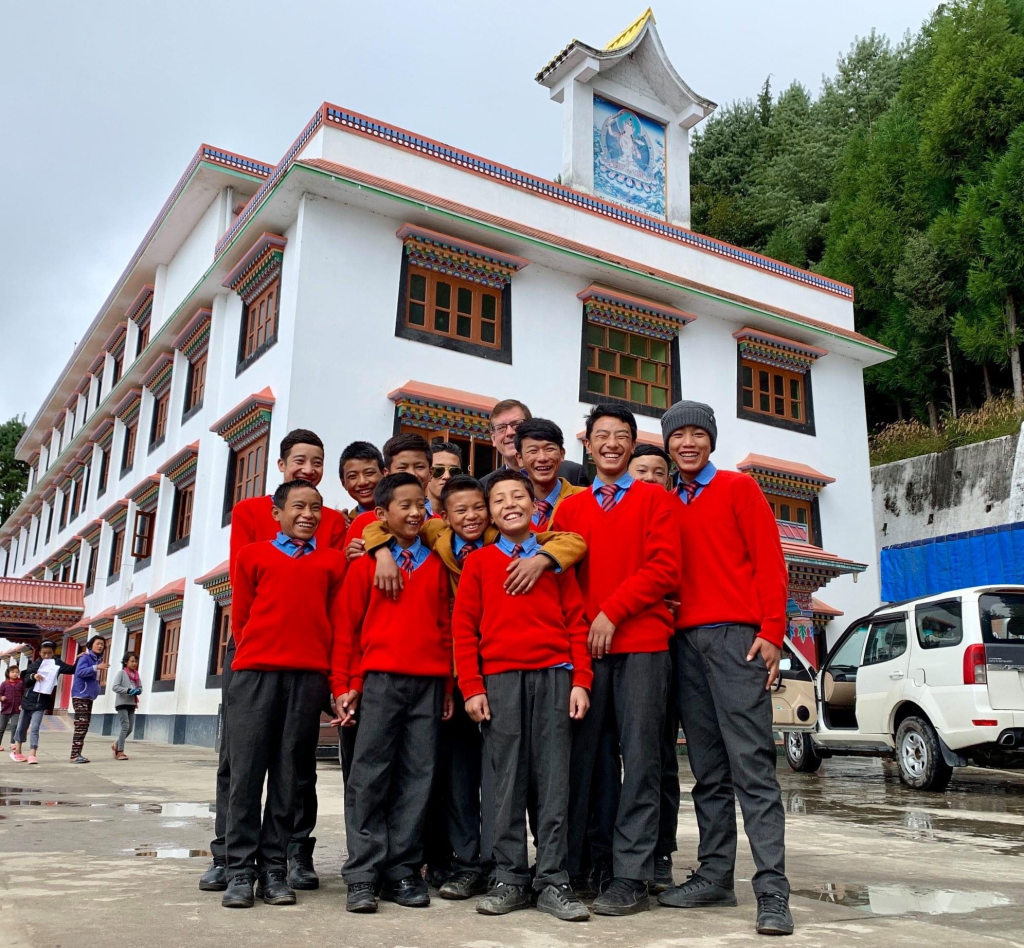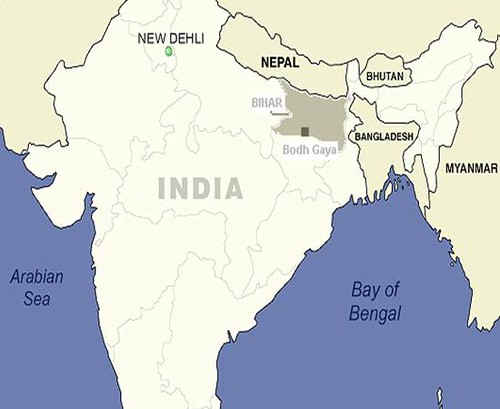
The issue I have had with Buddhism over the years is that it seems to allow for so much acceptance of human suffering that it does not lead to a desire to help others avoid or overcome disease or disaster. “That’s life.”
Bihar, India. Studying in Japan back in college, I had a very unique Buddhist experience, one of which I did not understand until years afterwards. I had joined a Buddhist student group that took me to the far north of Japan where we re-planted the mountainsides (“Shinnen No Mori”). This was an international concept that I thought I got: reforestation is good for planet earth.

Years later I figured out what we did that summer was not improving the environment but improving ourselves. I learned that the land was owned by a paper company, and we students rose at dawn, climbed the mountain and consumed only rice balls and tea all day long as we planted seedlings that would one day become paper. The Japanese Buddhist students were not inspired by growing trees – they were growing their souls.
The issue I have had with Buddhism over the years is that it seems to allow for so much acceptance of human suffering that it does not lead to a desire to help others avoid or overcome disease or disaster. “That’s life.”
Although not a Buddhist, a member of my own family believes that if he is not hurting anyone, he is helping the world. That sentiment is how I have understood Buddhism to be, and I don’t buy it. I believe people have a social and moral obligation – both theological and humanistic obligation – to assist one another.

‘Engaged Buddhism’
There are socially-oriented movements within Buddhism. Perhaps the most well-known leaders of such an organization would be the Vietnamese monk Thich Nhất Hạnh. Teacher, author, poet, and peace activist who now lives in France, he founded the groundbreaking School of Youth for Social Services in Saigon in the early 1960s.
This grassroots relief organization – a neutral corps of Buddhist peace workers – sent Buddhists into rural areas to establish schools, build healthcare clinics, and help re-build villages bombed during the Vietnam War.
I know about Nhất Hạnh because he traveled to the U.S. to study at Princeton, and later lectured at Cornell and Columbia. His focus at the time was to urge the U.S. government to withdraw from Vietnam and he urged Martin Luther King, Jr. to publicly oppose the Vietnam War. King nominated Hanh for the Nobel Peace Prize in 1967.

Although overshadowed by the Dalai Lama, Nhất Hạnh has become an important influence in the development of ‘Western Buddhism.’ His teachings and practices aim to appeal to people from various religious, spiritual, and political backgrounds, intending to offer mindfulness practices for more Western sensibilities. Thich Nhất Hạnh received training in Zen and the Mahayana school of Buddhism and was ordained as a monk in 1949.
Probably the greatest example of Buddhist social responsibility is the welfare state created by the Buddhist emperor Ashoka (B.C. 274-236). Some scholars have argued that Buddhism arose in India as a spiritual force against social injustices, against degrading superstitious rites, ceremonies, and sacrifices. It denounced the tyranny of the caste system which exists to this day. It specifically advocated the equality of all men and emancipated woman, giving them complete spiritual freedom.

Photo: author.
Ashoka was a devotee of nonviolence, love, truth, tolerance, and unlike the Dalai Lama, vegetarianism. As the peace-loving ruler of one of the world’s largest, richest, and most powerful multi-ethnic states, this Indian king is considered an exemplary ruler who tried to put into practice a secular state ethic of non-violence. It was Ashoka that built stupas to keep Buddhism alive from India to Indonesia.
En route my India pilgrimage to visit the magnificent ruins of the world’s first great academic institution – Buddhist Nalanda University – I paused to visit Wat Thai Nalanda. There I met Abbot Phramaha Phan Thaekrathoke who has visited New York on many occasions. He pointed me to their website for a full explanation:
“We esteem highly all those who devote their lives for such worthy cause. The present world calls for us, believers of all faiths, to join together as a combining energy in attaining the true and perfect peace of the world.
“We should not dream only in the narrow idea of each doctrine which involves in the selfishness and impractical truth of different Ideals.
“Real peace and mutual understanding between different religion and doctrines is the fundamental object to which we, all peace lovers, must devote ourselves.
Wat Thai Nalanda has built a two story Thai-style building to serve as a free community health clinic. In addition, they built 16 concrete sanitary toilets next to this clinic that may be the nicest in Bihar State. These monks teach about 150 local poor students on weekends and provide the children with school supplies. In addition, the monastery runs a food bank and provides medication and clothing to the local community. Fantastic.

Here in Bodhgaya, I am spending much time with Lama Thupten Phuntsok, the founder of a Tibetan orphanage known as Manjushree in the Indian Himalayan Mountains south of Dharamshala that I have written about (story). This orphanage serves only Buddhist children – but the area contains children from no other faiths.
Although my own organization, Orphans International Worldwide (OIW) is by our own mandate Interfaith, after the Tsunami in Muslim Ache, Indonesia we opened a home for Islamic children as there were no other children there.
In my own faith tradition, Christianity, we have Liberation Theology stemming from Catholic roots and the Social Gospel movement coming out of Protestantism at the turn of the century. I was stunned to learn on trips to Istanbul that many great mosques offered homeless shelters, feeding programs and libraries for the poor hundreds of years ago. Tikkun olam in Judaism is the concept of repairing the world. Hindus who believe in Karma are often socially engaged. In short, all faith traditions including Buddhism have the possibility to help humanity. Buddhism, like other traditions, could do more to fulfill this moral obligation.
Pilgrimage to Buddha’s Holy Sites
Main Sites:
Lumbini, Bodh Gaya, Sarnath, Kushinagar
Additional Sites:
Sravasti, Rajgir, Sankissa, Vaishali, Nalanda, Varanasi
Other Sites:
Patna, Gaya, Kosambi, Kapilavastu, Devadaha, Kesariya, Pava

On Pilgrimage: Following the Footsteps of Buddha Across N.E. India: 14 Parts
1. HuffPo: On Pilgrimage: Following the Footsteps of Buddha Across N.E. India
2. Daily Kos: Under the Bodhi Tree in Bodhgaya Where the Prince Became The Buddha
3. Daily Kos: Photo Essay of Bodh Gaya, Where Buddha Became Enlightened
4. Daily Kos: Next Step of Indian Pilgrimage: Mountain Where Buddha Preached
5. HuffPo: Touching the Untouchable in a Rural Indian Village
6. Daily Kos: Rediscovering the World’s First Great University in Buddhist India
7. Stewardship Report: Buddhism for Beginners: Insights from a Non-Buddhist
8. Daily Kos: Buddhism and the Universal Concept of Social Responsibility
9. HuffPo: Can I Help Support Education and Orphan Care in Bihar, India?
10. Stewardship Report: Most-Photographed Man in the World Prepares to Retire
11. Daily Kos: Varanasi: Holy City of Buddhists – As Well as Hindus, Jainists, Jews
12. Daily Kos: On the Banks of the Ganges: Continuing the Search for My Soul
13. HuffPo: My Pilgrimage Complete: Lessons Learned, Life Continues Like a Wheel
14. Daily Kos: Pilgrimage Postscript: Pneumonia and Possible T.B.
Buddhism and the Universal Concept of Social Responsibility (Originally published in Daily Kos, Jan. 18, 2012)
